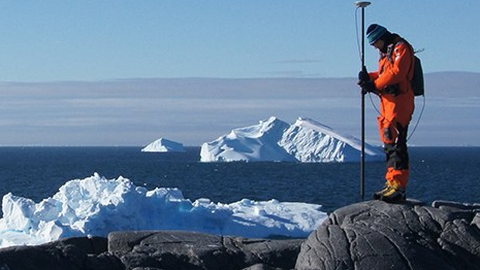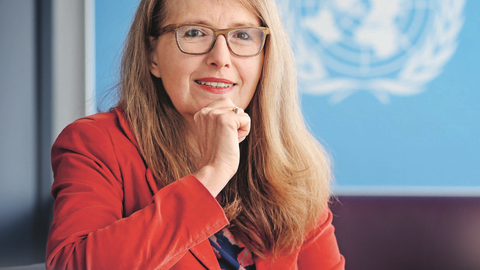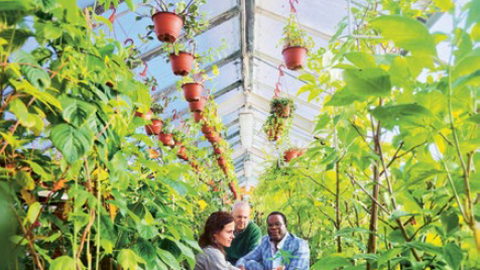Sustainable and excellent in research

Mit Carbonbeton hat das Team um Prof. Manfred Curbach einen Baustoff der Zukunft geschaffen. Es gibt bereits Anwendungen. Der CUBE am Campus der TUD ist das weltweit erste Gebäude aus Carbonbeton. © Amac Garbe

Dresden lebt an und mit der Elbe. Dr.in Marta Markiewicz erforscht, wie sich Wasserverschmutzung durch den Menschen auf Organismen in aquatischen Ökosystemen auswirkt. © Amac Garbe

Sieht aus wie Spielzeug, ist aber keines: Im Eisenbahnbetriebslabor der Fakultät Verkehrswissenschaften »Friedrich List« wird Bahnlogistik erprobt. © Amac Garbe
Table of contents
Innovative research can support and accompany transformation processes toward a sustainable society, as it makes a significant contribution to solving environmental and climate-related issues. With its large number of pioneering interdisciplinary research projects, TU Dresden possesses broad, internationally visible research expertise.
With its large number of pioneering interdisciplinary research projects, TU Dresden possesses broad, internationally visible research expertise. The spectrum ranges from ground-breaking fundamental research to application-oriented projects with high transferability. The strategic research priority areas represent the strongest fields of research at our university. The research profile of TU Dresden is given its special quality by the close cooperation with non-university research institutions and research-based cultural institutions in Dresden within the framework of the DRESDEN-concept Science and Innovation Campus. This institutionalized and actively used cooperation offers the opportunity to profitably expand and utilize synergies across disciplines in the area of sustainability.
The exemplary selection listed here and the large number of actively involved members of TU Dresden encourage us as a university community in our plan to shape societal change together in a sustainable way, while at the same time being a role model for society.
Energy, mobility, and the environment
One focus is on energy, mobility, and environmental research with a high development
potential across all areas and faculties. The strong roots of TU Dresden in its region are
evident in many projects: Research results are tested and applied directly in Dresden’s urban space or in the region. Existing expertise can be seen in a variety of research projects and fields.
The building-related sector is a key lever for municipal climate protection. In the NeutralPath cooperation project with the state capital of Dresden, climate-neutral energy-supply technologies are being tested in two residential districts of the city: This shows how the sustainable refurbishment of existing buildings, resource-conserving new construction, and the conversion of the energy supply can be carried out in a climate-friendly and affordable way.
The city also became an object of research in the HeatResilientCity research project, a joint project between the Leibniz Institute of Ecological Urban and Regional Development (IOER), TU Dresden, HTW Dresden University of Applied Sciences, and the state capital of Dresden. Based on research findings, stakeholders are empowered to implement effective, social, and needs-based measures for adapting to the summer heat. The project was awarded the German Sustainability Award for Research in 2022 as a significant contribution to a heat-resilient city.
The collaborative project OLGA involving the city, state, and other participants, is intended to optimize land use along water bodies and on agricultural land, and to promote regional value creation in the agricultural and food industry in the Dresden region. Various partners of the state capital Dresden, TU Dresden, and the Dresden environmental center "Umweltzentrum Dresden" are working together to train regional stakeholders in the development of practical solutions for the sustainable use of land and resources, and to build up urban-regional cooperation in the Dresden region.
A beacon of climate-conscious construction at TU Dresden with the potential to become a game changer is the high-tech material carbon concrete. In this, the classic reinforcing steel is replaced by carbon fibers. Thanks to the corrosion resistance and the lower concrete cover required, enormous amounts of energy are saved during production, and CO2 emissions as well as transportation costs are significantly reduced. The world’s first Carbon-concrete building CUBE opened at the end of 2022. This is an impressive demonstration of how this building material can be used directly in practice.
This is where the future project LAB – Living Art of Building initiated by TU Dresden comes in. In the future, this research center will provide answers to the pressing questions in the construction industry in order to facilitate the use of carbon-concrete technology and thus make an important contribution to climate neutrality. Employees from science and technology will work closely with industry in the laboratory facilities – the only ones of their kind in the world—to develop ideas and solutions for the development of new materials, technologies, processes, and further digitalization on a large scale.
Energy and material properties are also central topics of sustainability research at TU Dresden. The joint project GreenCap between TUD and other European universities and stakeholders is developing high-performance and sustainable cylindrical supercapacitors based on layered two-dimensional materials (2DMs) and ionic liquids. The project identifies new high-end applications with comprehensive impact assessments of social, environmental, and economic sustainability.
The OSens (Organic Sensors and Solar Cells) project at the Chair of Optoelectronics is researching organic solar cells that are efficient, cost-effective, lightweight, flexible, semi-transparent, and sustainable to produce. They therefore offer a key solution for a large-scale, low-cost, and sustainable energy supply, as the energy payback time for organic solar cells is significantly shorter than that of silicon-based cells.
The EffiziEntEE project (Efficient integration of high shares of renewable energies in technically and economically integrated energy systems) is dedicated to the challenges of fluctuating characteristics in the decentralized supply of renewable energies. The project is a joint venture between TU Dresden and TU Hamburg. The intention, by linking the energy sectors, is to develop options for absorbing, storing, and supplying surplus electrical energy from renewable energy sources.
TUD is also involved in important collaborative projects in water and climate research:
The Center for Advanced Water Research (CAWR) pools the expertise of the Helmholtz Centre for Environmental Research (UFZ) and TU Dresden in order to work together in a targeted, competent, and interdisciplinary manner on key challenges in the water sector and to develop monitoring systems. TU Dresden is also involved in the Global Water and Climate Adaption Center (ABCD-Center) joint project. Here, leading scientific institutions on two continents analyze human adaptations to the consequences of climate change with a special focus on the topic of water security and the transfer of findings into practice.
Mobility of the future is a central topic that is addressed in several projects at TU Dresden.
The Lighthouse Professorship and Chair of Transport Modelling and Simulation is dedicated to the world of transportation, taking into account justice, fairness, environmental impacts, and other ethically relevant effects of transport. At the Chair of Chemical Process Engineering, synthetic fuels are being made more sustainable and efficient. The Chair of Mobility System Planning is researching into indicators of urban sustainable mobility in the EU project „Sustainable Urban Mobility Indicators“ (SUMI).
The "Friedrich List" Faculty of Transport and Traffic Sciences is the largest academic center
of excellence in the field of traffic sciences in Germany.
TU Dresden is at the forefront of the MOBILITIES for EU initiative, spearheading three innovative technology interventions in two key pilot projects. These interventions represent a significant step towards sustainable urban mobility and climate neutrality. By deploying cutting-edge solutions such as advanced 5G communication networks and bi-directional charging systems, we aim to accelerate the transition to greener transport solutions. Together with esteemed European partners, we are committed to shaping a greener urban landscape in line with the ambitious goals of the European Green Deal.
In order to make sustainability more measurable – especially at universities – TU Dresden continues to coordinate the Germany-wide project UNISIMS (University Sustainability Indicator Monitoring System) with 16 pilot universities. The aim of the project is to develop a standardized web-based benchmarking system for assessing sustainability at universities.
Societal change
In order to avoid further, irreversible damage to the ecosystem, we need to operate within the planet’s limits and thus bring about societal change toward a more sustainable society.
The excellence measure „Disruption and Societal Change“ (TUDiSC) profiles disruption as a fundamental category of research into societal change. Its prerequisites, logics, and effects are recorded and researched here in an interdisciplinary manner, both in terms of basic principles and exemplary objects. The focus is on the political, economic, social, and cultural challenges that societies face in dealing with disruptions.
In Lusatia, TU Dresden is actively contributing to shaping structural change with the establishment of the decentralized TUD|Lusatia Campus. Here, research projects
(such as in the previously cited LAB, the German Center for Astrophysics (DZA), or the CircEcon project) are working on solutions to global challenges in order to further develop Lusatia into a central area for knowledge and transfer. Sustainable construction, renewable energy, and the mobility of the future also play a role, as do targeted educational measures and participation in societal debates.
As multipliers, teachers have a key role to play in sustainable development. The Teacher Academy Project – Teaching Sustainability (TAP-TS) of the Center for Teacher Education and Educational Research (ZLSB) at TU Dresden is one of eleven European projects in the Erasmus+ Teacher Academies funding line dedicated to teachers’ initial and continuous education. The project aims to reinforce the skills of teachers and student teachers in teaching sustainability. Participants from various European countries develop, trial, and implement teaching and learning materials on the topic of sustainability.
Based on the goal of measuring and evaluating sustainability in various disciplines, the PRISMA Centre for Sustainability Assessment and Policy pools the skills of TUD researchers and other partner institutions in order to create synergies. The focus is on questions of economically successful as well as ecologically and socially compatible long-term development, taking into account spatial and temporal conditions with innovative, interdisciplinary evaluation approaches.
The campus as living lab
The TU Dresden campus is based on a holistic open space concept that combines ecological, social and aesthetic aspects. Mobility is part of this. It is in harmony with a visionary campus design. Energy efficiency is the top priority in everything we do. Because our campus is more than just a place of learning - it is a real laboratory for a sustainable future.
The aim of the Master Plan Campus Design research project, in which the Institute of Landscape Architecture, the Institute of Transport Planning and Road Traffic, and the Directorate Facility Management cooperated, was to develop a sustainable overall concept for the development of open spaces on the TU Dresden campus. In a discussion with the university public, the resulting spatial and design scenarios were further developed and brought together in an overall concept, taking into account the open-space, traffic-planning, and ecological networking of the campus with its surroundings. Since 2019, the Master Plan Campus Design has served as the basis for in-depth planning and the implementation of individual measures. The main goals are to increase the quality of life on the campus as well as its ecologically sustainable development.
The Chair of Mobility System Planning’s mobility concept for TU Dresden’s main campus builds on the considerations set out in the master plan for the design of the campus. It provides solutions and recommendations for action in order to harmonize the diverse mobility needs with a future-oriented design of the main campus. The concept takes into account analysis findings on the mobility behavior of employees and students from mobility surveys conducted in 2008, 2018, and 2022. The close dovetailing of the mobility concept and campus design master plan opens up greater scope for action to implement the scenarios developed.
In the CAMPER-MOVE: CAMPus Energy-consumption Reduction research project, an interdisciplinary project team is dedicated to the energy efficiency of the TUD campus.
Under the leadership of the Chair of Building Energy Systems and Heat Supply, the aim, in cooperation with the central university administration and external project partners, is to accompany and evaluate the practical implementation of energy-efficiency measures (construction, systems engineering, operation) with measurement programs and detailed analyses. Regenerative as well as process and usage-specific energy sources are being explored on the campus, and further concepts for the establishment or expansion of existing energy networks (heating, cooling, electricity) are being developed.
Research-oriented teaching and transfer
Research-orientated teaching is a key component of teaching at TU Dresden. Examples of this include a unique postgraduate programme at the Faculty of Environmental Sciences in cooperation with the Federal Ministry for the Environment and the United Nations and the close cooperation between TU Dresden and the FLORES Institute of the United Nations University (UNU). In future, all innovation and transfer activities will be bundled in the TUD|Excellence Centre for Innovation, Transfer and Entrepreneurship (TUD|excite).
Research-oriented teaching is a key component of teaching at TU Dresden. The postgraduate course in Environmental Management at the Faculty of Environmental Sciences, which is unique in Europe, focuses on sustainability and is offered in cooperation with the Federal Ministry for the Environment, the German Environment Agency, and the United Nations (UNEP, Nairobi and UNESCO, Paris). On this course, specialists and managers from developing and emerging countries receive training in integrated environmental management and relevant specialist topics.
TU Dresden cooperates closely with the FLORES Institute of the United Nations University (UNU). The UN facility in Dresden addresses the sustainable and integrated management of water, soil, and waste resources. A joint doctoral program has also been set up on this topic.
As a strategic project within the Universities of Excellence funding line, TU Dresden is repositioning its activities along the innovation chain under the umbrella of the Excellence Center for Innovation, Transfer and Entrepreneurship TUDlexcite TUD|excite develops pathways for accelerating innovation and transfer management and generating enthusiasm for the new. Excite is not only an acronym for a new institutional platform, but also expresses the ambition and motivation with which TUD approaches these topics: Excellence in innovation, transfer and entrepreneurship – inspiring and enabling a future worth living. In particular, the aim is to promote sustainable innovations in line with the Sustainable Development Goals.






